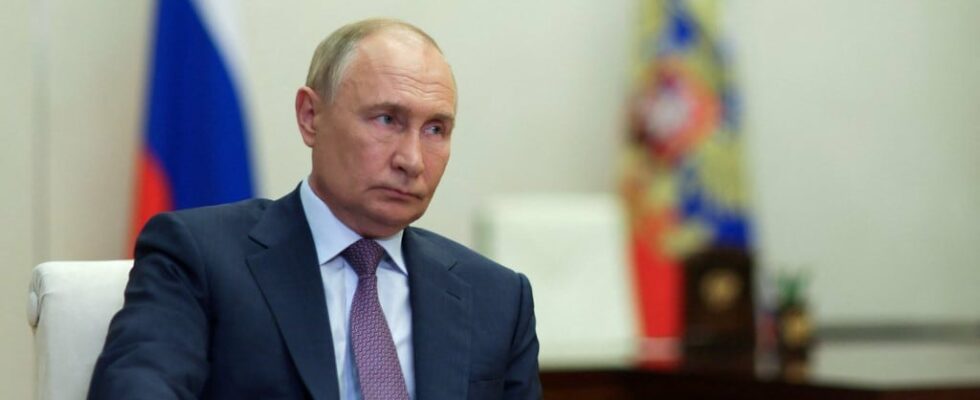By launching a surprise attack in the Kursk region on August 6, the first offensive by a foreign army on Russian territory since World War II, Ukrainian forces broke a taboo that was more than 80 years old. Insufficiently prepared for this incursion that it had not anticipated, the Russian army had no choice but to retreat.
Six days after the start of the operations, Ukrainian President Volodymyr Zelensky claimed responsibility for the capture of 74 localities. A new fiasco for the head of the Kremlin, whose army is only advancing in Ukraine at the cost of very heavy losses, and is now forced to fight on its own lands. “The war has now really arrived on Russian soil. And we sense a great disorganization, even a panic, of the power”, points out the Franco-Russian historian Galia Ackerman, author of the book The Immortal Regiment, or Putin’s Sacred War (First Parallel, 2023). Interview.
L’Express: The Ukrainian army has claimed to have captured 1,000 km2 in Russia since the start of its offensive. Is this a harsh blow for the Kremlin?
Galia Ackerman: This is a huge snub to Vladimir Putin. Russia was not prepared for this operation at all. It was organized in the utmost secrecy and Russian intelligence was not able to detect it. As we had already seen during the mutiny of Yevgeny Prigozhin [NDLR : l’ancien patron du groupe de mercenaires Wagner] In 2023, the Russians have largely reduced their troop presence on their own soil, which explains the speed of the Ukrainian advance, whose forces are said to have already occupied between 44 and 74 localities. It is no longer just a question of drone bombings like in recent months on refineries or military sites: the war has now really arrived on Russian soil. And we sense a great disorganization, even panic, of the authorities.
Does this Ukrainian offensive weaken Putin internally?
Certainly, although in a dictatorial regime such as his, we will not know immediately. For the time being, he has tried to occupy the media terrain by presenting himself with his close guard as Alexander Bortnikov, the head of the FSB, his new Minister of Defense, Andrei Belousov, and his predecessor in this post, Sergei Shoigu.
Putin could instruct Alexei Dyumin, secretary of the State Council and personal aide to the president, to stop the Ukrainian breakthrough. This choice would be revealing, since it would imply that the Russian army general staff is not capable of coordinating resistance to Kiev’s offensive. We have learned in recent months that the Russian Defense Ministry is a hotbed of corruption and many heads have started to roll. After this new failure, it could start again with a vengeance.
What could be the political repercussions of this Ukrainian incursion into Russian territory?
The management of this crisis is highly criticized by the Russians. On the one hand, more than 121,000 people have already fled the Kursk region, and this figure could quickly reach 200,000. They have spread throughout the country, carrying with them the dire news that they have had to leave their homes in the face of advancing Ukrainian troops. This is starting to create a groundswell within the population, with, for example, families worrying about their children’s return to school in September.
So there is a rise in public discontent. On the other hand, there is also fierce criticism from the most nationalist segment of the Russian population. This comes in particular from military bloggers, who go to the field and have a large following in Russia on Telegram: they denounce Russia’s flagrant unpreparedness for this attack.
Could this rise in discontent spread?
For the time being, I do not believe in the scenario of a population revolt. However, we see this discontent at different levels. In the Russian regions, there is a very noticeable drop in contracts with the army to go and serve in Ukraine. On average, the quotas set by the government are filled by only a third. This situation lends weight to the hypothesis of a new wave of mobilization that could occur by the end of 2024. If it does take place, I think that it will go down much less well than the first one among the population. And we can expect even greater avoidance phenomena than in September 2022.
Does this discontent also exist among the Russian elite?
Absolutely, and I think it is more worrying for the government. For the Russian elites, the war has many disadvantages. They can no longer travel abroad easily, nor enroll their children in the best Western universities. In addition, many of their assets have been frozen abroad and some of their companies nationalized in Russia. In addition, heads have started to roll within the Russian elite. And when some members of the elite have their backs to the wall, it increases the risk of political unrest, and potentially, of the overthrow of the power in place. In a context of popular discontent with the war, any change in the leadership of the country could become much more acceptable to the population. I think that is a risk that Putin clearly has in mind.
Can Ukrainian-taken territories push Putin to negotiate?
Putin said he was ready to negotiate on Russian terms, that is, recognition of the four regions occupied by his troops and Crimea, a neutral status for Ukraine, and the limitation of its army. It is not completely impossible that the fact that Russian territories are now in the hands of Ukraine will push him to change his position. But I remain cautious. Volodymyr Zelensky is currently planning a second peace summit, in which he wants Russia to participate. However, I think that, under the current conditions, Russia will not attend. It seems more likely to me that the fighting will continue, even if more and more people in Russia have an interest in ending this war, of which Putin remains the main driving force.
.
